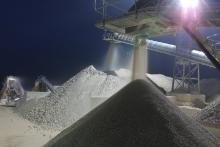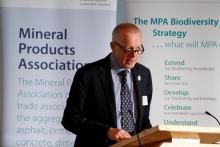
The Mineral Products Association (MPA) welcomed UK Chancellor Rishi Sunak's announcement of a freeze in the Aggregates Levy for 2022-23 and said many of the spending pledges on transport infrastructure, prisons and housing were welcome news for its members. The investment in skills and research and development was also welcomed.
However, according to the MPA, the trade association for the aggregates, asphalt, cement, concrete, dimension stone, lime, mortar and silica sand industries, the Chancellor struck an ominous note for some members of the MPA family, saying, 'Do we want to live in a country where the response to every question is: “what is the government going to do about it”? Where every time prices rise, every time a company gets in trouble, every time some new challenge emerges, the answer is always: the taxpayer must pay? Or do we choose to recognise that Government has limits. That Government should have limits.'
The London-headquartered MPA says this ignores the Government decisions that had exacerbated the situation, meaning that even before gas prices spiked, the UK had a higher carbon price and among the highest industrial energy prices in Europe.
MPA chief executive Nigel Jackson said: "Budgets are always a mixed bag, and this one was no different; the aggregates levy freeze is welcome. This, of course, has to be set against the increases in Corporation Tax and National Insurance and the removal of the red diesel rebate.
"The investments in infrastructure and housing announced are, of course, welcome, and our members stand ready to deliver, but there is a long track record of disappointing delivery on previously stated government ambitions, so our welcome is tempered by concern about the risk of delayed delivery."
Asphalt Industry Alliance (AIA) chair Rick Green said that while the AIA welcome the Chancellor's five-year spending commitment for local roads, the sums announced yesterday suggest little movement on current levels. As such, Green said the AIA "looked forward to reviewing the detail".
He added: "ALARM 2021 reported that the backlog of repairs is now more than £10 billion, with local authorities reporting that if they had sufficient funds to meet their target conditions, there would be an additional 14,400 miles of roads in a good state of repair and another 2,000 fewer miles in urgent need of repair.
"What's needed is an investment of at least an additional £1.5 billion per year from central government sources on 2021 levels if the backlog of repairs to be tackled and further decline prevented."
Meanwhile, Jeff May, director of government relations and business development at the Construction Products Association (CPA), said: "We think it is understandable that the focus of the Chancellor's Budget today was on encouraging economic growth, fiscal discipline and resisting demands from the private sector for further expenditure, and rising inflation in all its forms triggering a vulnerability to interest rate rises.
"We were disappointed to see little help for major industrial users with energy costs or any further financial details on net-zero strategies. That said, we welcome a handful of relevant items, in particular, the announcement of a 12-month relief on businesses rate hikes arising from premises investment, the cancellation of the planned increase to the business rates multiplier, and the extension of the uplift to the Annual Investment Allowance will go some way to supporting manufacturers while we seek to exit the pandemic in the short term.
"Given the pre-Budget announcements around various net-zero and related sustainability strategies, along with the release in September of the National Infrastructure and Construction Pipeline, the major elements of spending for our sector appear set.
"The key, then, as always, will be delivery. If industry and government can work together and address the supply side risks in particular – labour and skills shortages, energy prices, logistics bottlenecks etc – then the economic stimulus from our sector in support of this Budget will be considerable."







